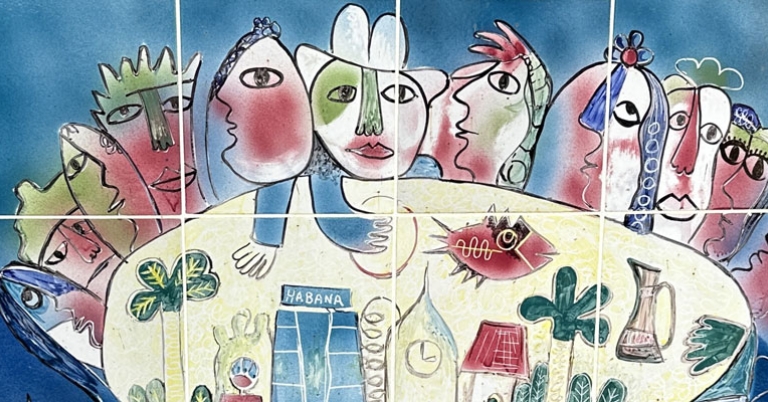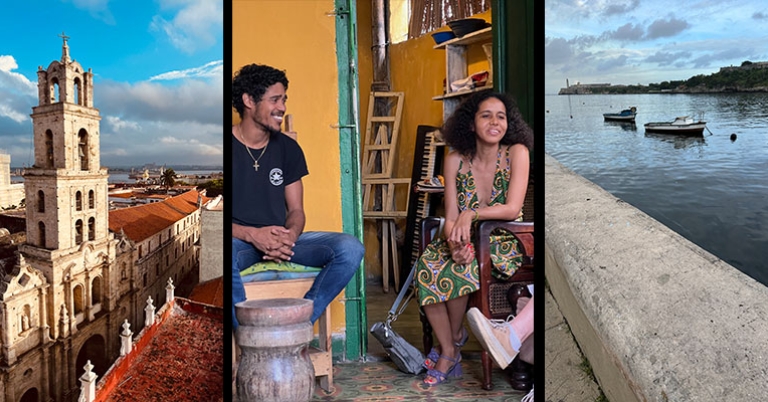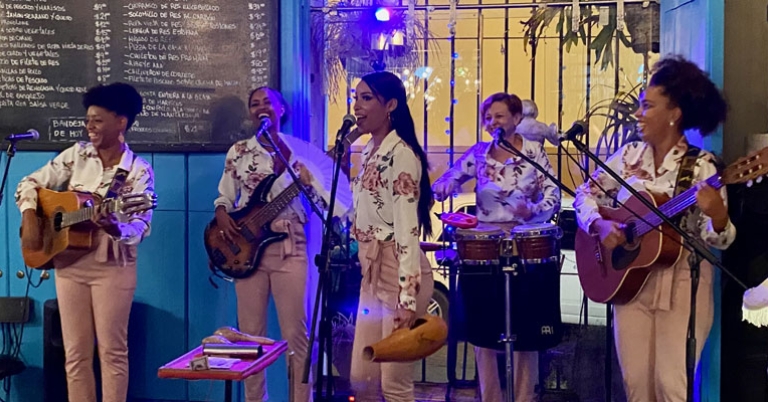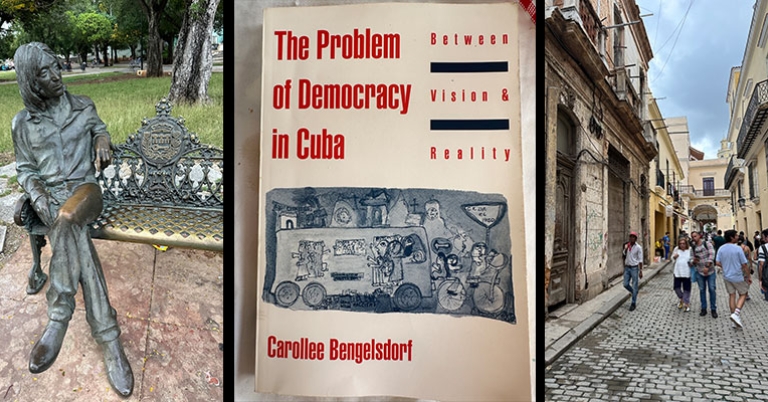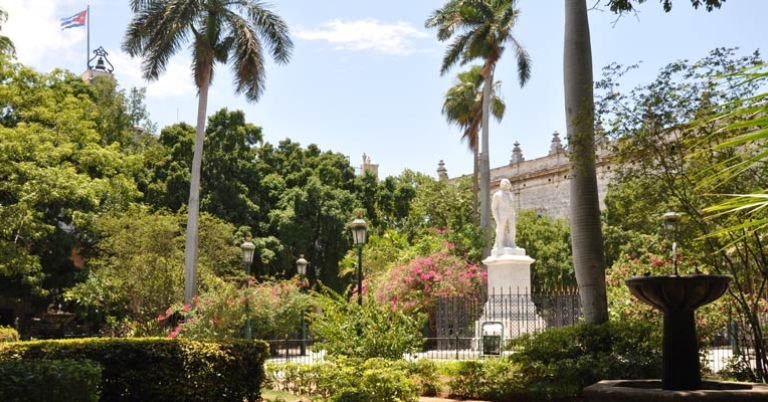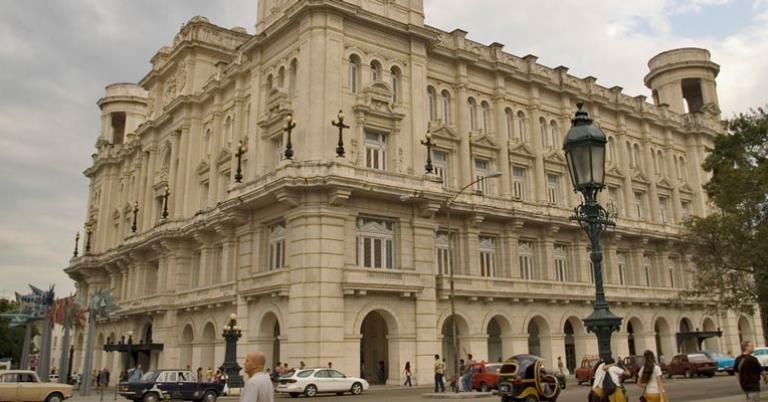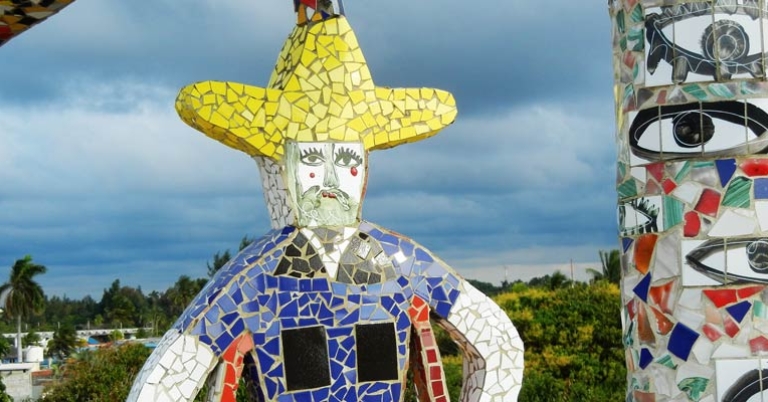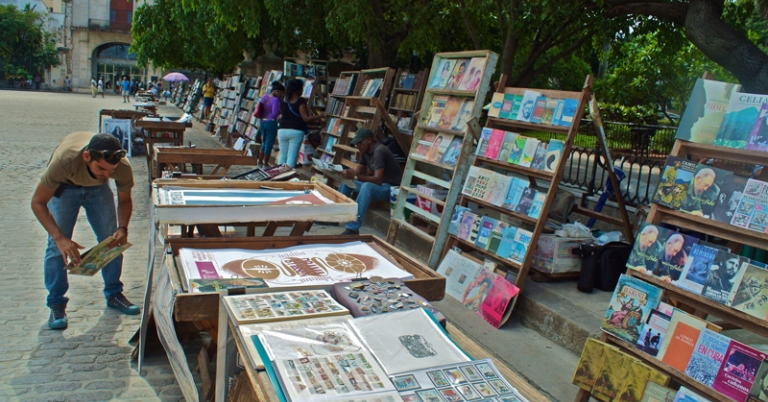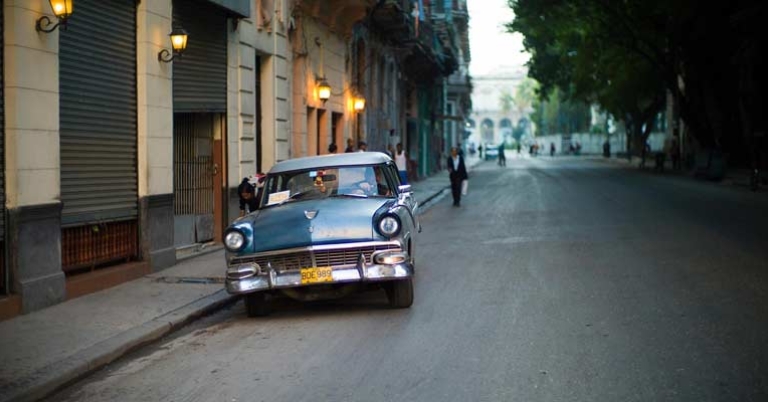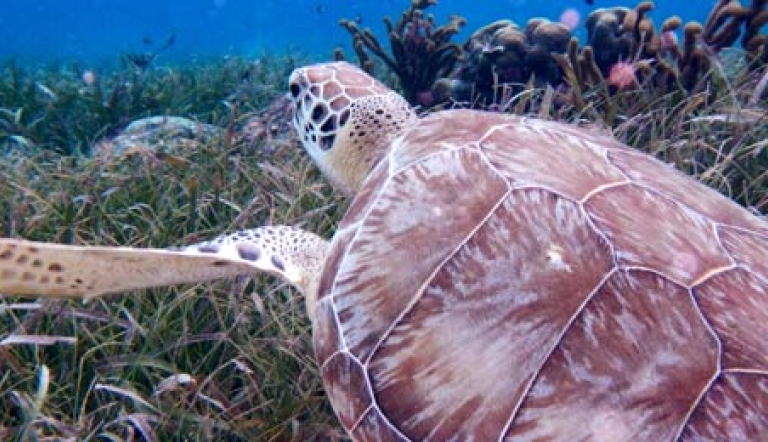Today`s Cuba: Confounding Realities
About this trip
Participants will meet Cuban writers, visual artists, architects, and filmmakers (as well as a social scientist or two) to get a sense of the complexities and contradictions of contemporary Cuban life. Topics of discussion will include issues related to gender, race, equality/inequality, the recent protests, the relations between Cuba and the U.S., and the ways these have intersected as a result of the current and multiple crises on the island.
Highlights
- Meet with Fernando Pérez, perhaps Cuba’s greatest living filmmaker. We will see his film “Suite Havana,” a portrayal of 10 Habaneros in the course of their daily lives on a single day, and discuss the film with him.
- Take a guided walking tour with Jaime Rodríguez, one of the three architects who initiated, in the early 1980s, the project to restore Old Havana, undertaken by the Office of the Historian of the City.
- Have a discussion with the sociologist Mayra Espina, whose work has focused for decades upon questions of equality and inequality, particularly in terms of race, gender, and generational divides.
- Visit the home of José Fuster, a ceramist and painter who has, with the help of his neighbors in the barrio of Jaimanitas, spent the last 25 years on a community development project centered around artistic production. Lunch with Fuster and a tour of the barrio.
- Meet a group of women who, when they were 15 to 19 years old, fought in the underground in Havana to overthrow the Batista regime during the 1950s.
- Also meet with a number of other Cubans, including David González, Eduardo Hernández, Daisy Rubeira, Roberto Zurbano, Janet Valdés, Alejandro Meroño, Marilyn Solaya, Fernando Funes of Finca Marta, and the drummers of Obiní Batá.
Meet your leaders
Carollee Bengelsdorf
Carollee Bengelsdorf is professor emerita of politics in the School of Critical Social Inquiry at Hampshire College. She is the founder of Hampshire’s Cuba Program, both with the Cuban Union of Artists and Writers and the Office of the Historian of the City of Havana. Her first trip to the island was in 1969, and she has maintained close personal and scholarly contact since. She is the author of The Problem of Democracy in Cuba and numerous articles on Cuban women. Her current research involves an oral history of the girls and women who fought in the urban underground in Havana, from 1952 to 1959, to overthrow the Batista dictatorship. Her book, Clandestinas, will be published by Duke University Press in 2024.
Margaret Cerullo
Margaret Cerullo is professor of sociology and feminist studies in the School of Critical Social Inquiry at Hampshire College. She first went to Cuba with Carollee in 1978 and has avidly followed developments on the island since. She has returned to Cuba many times to attend conferences and to direct Hampshire’s semester-long program in Cuba. She is engaged in research about lesbians’ experiences in Havana before and after the Revolution.
What’s it like to go to Cuba with Carol and Margaret?
Responses from last year’s participants:
“Confounding indeed! What a trip. This could be retitled, “No sign of tourist traps-Cuba exposed.” Carollee and Margaret have deep roots in this country and they took great care to introduce us to extraordinary people: accomplished novelists, Afro-Cuban feminists, renowned architects, painters, and filmmakers. Meeting just one of them would have made it a special week but the culmination of these encounters with these honest, thoughtful Cubans who shared their stories so openly was a privilege. Carollee and Margaret have curated a trip like no one else could. It made me envious of the Hampshire students who have had the chance to work with professors like Margaret and Carollee and the colleagues they have in Cuba. Thank you so much.”
“The experience was deep and substantive yet broad in its cultural coverage. Interaction with and access to a wide range of people from film, literature, art, architecture and historical participants in raising Cuba to where it is today was incredible. This was a month’s worth of experience and exposure to the ‘anthropology’ of Cuba in a little more than a week. There was focus and order to our itinerary with added flexibility when needed.”
“An extraordinary week of cultural learning and connection with a resilient Cuban people together with great food and fun. This trip is like no other. The leadership of Hampshire professors Margaret and Carollee is deeply personal and intellectually stimulating. They built an itinerary designed to connect us to their longtime friends in art, music, writing and film, even farming and historical restoration architecture. Thank you for your trust bringing us into living rooms, on patios, to the farm, and on the streets with your friends in helping us discover the richness and challenge of Cuban life. I know we just skimmed the surface.”
“I loved this trip! It was so much better than trying to see Cuba on my own would have been. A little pricey but well worth it! We met and heard from so many Cubans, including artists, writers, historians, filmmakers, entrepreneurs and those who had participated in the revolution. Their perspectives were varied and enriching. We never went to a single fortress, and only one museum. I felt so lucky to reap the benefit of the long relationship Carollee and Margaret have nurtured with this country over so many years. Their network of friends, thinkers, and ordinary Cubans is the greatest asset to the trip. We had a wonderful, simpatico group and an excellent tour guide in Atila, who made sure we never hesitated to ask a question, because he always had the answer, or found it out for us. And one last note, we had a comfortable tour bus with a wonderful driver (Vladimir) who took us everywhere, on time, and even on unscheduled excursions. Never having to worry about how to find a place or securing a taxi is a wonderful benefit to a well-run group trip. Meals in wonderful restaurants were all prepaid and pre-booked, another detail I appreciated.”
$4,595
Per person
About this price
Land cost only. Does not include round-trip airfare to and from destination.
Single room supplement $495
What makes us different
Rich content
Cultural Discovery
Support local communities
Flight arrangements
Low stress travel planning
Service anytime
Daily Itinerary
Print ItineraryHavana
Havana
Havana
Havana
Havana
Havana
Havana
Havana
Departure
Pricing
Print Pricing$4,595
Per person
About this price
Land cost only. Does not include round-trip airfare to and from destination.
Single room supplement $495
What's Included
- Activities and meals as mentioned in itinerary
- Cuban tourist visa ($65.00)
- Arrival and departure transfers based on individual flight schedules
- Full time guide for the duration of your program
- All tips
- Non alcoholic beverage with meals
What's Not Included
- International airfare
- Items of personal nature
- Travel Insurance
Pricing Details
Full payment of $4595 is due to hold space on this trip. This payment is not refundable; 100% cancellation fee.
Holbrook Travel strongly recommends the purchase of travel protection for medical emergencies while traveling and to protect your investment. Please note the purchase of Cancel for Any Reason Coverage or to exclude pre-existing conditions with Trip Cancellation coverage may require policy purchase within 10-14 days of your initial deposit, depending upon the provider.
Single room supplement $495
Final payment due date: November 01, 2024
Travel Info
Print Travel InfoEntry & Exit Requirements
U.S. citizens need a valid passport and a tourist card/visa to enter Cuba. Passports must be valid at least six months after the date of entry and have at least two blank pages for entry/exit stamps.
As of November 2024, Cuban tourist visas are completed electronically. All travelers must have a Cuban e-visa, which includes a health declaration form. The Cuban e-visa is valid for a single entry and allows the holder to stay in Cuba for 90 days. Your program includes the e-visa fee. You will receive an email several weeks prior to departure with a link to your assigned e-visa number. This form may only be completed within 7 days prior to departure and must be completed before checking in for your flight to Cuba. (Note: This may be easier to do on a laptop or desktop rather than your smart phone.) Upon completion, you will receive an email with a PDF including a QR code for your specific e-visa. Please print or save this document to your phone for ease of submission when requested.
If you are not traveling with a U.S. passport or you are a Cuban-born person, please check with the Cuban Embassy for requirements based on your nationality. Also, be sure to have your required documents (passport, Cuban e-visa) for re-entry into the U.S.
Please note: The U.S. Department of Treasury, Department of Foreign Assets Control (OFAC) requires that all travelers to Cuba retain itineraries for at least 5 years.
Health Information
IMMUNIZATIONS
The Centers for Disease Control recommends that all travelers be up to date on routine vaccinations such as measles-mumps-rubella (MMR) vaccine, diphtheria-pertussis-tetanus vaccine, varicella (chicken pox) vaccine, and your yearly flu shot before every trip.
There are no vaccinations required for entry into Cuba, unless you are traveling from a country where yellow fever transmission is a risk, in which case proof of yellow fever vaccination is required. The CDC recommends vaccination against hepatitis A, hepatitis B, and typhoid for most unvaccinated travelers to Cuba.
Please consult your physician for additional information and recommendations based on your individual circumstances.
INSECT-BORNE ILLNESSES
Dengue fever and Zika virus are known to be present in Cuba. Travelers to Cuba should protect themselves against insect bites: Cover exposed skin with lightweight, long-sleeved shirts and pants, consider treating clothes with permethrin, and use an insect repellent containing an active ingredient like DEET or picaridin. Apply sunscreen first, followed by the repellent (preferably 20 minutes later). As a precaution, the CDC advises women who are pregnant to consider postponing travel to any area where Zika virus transmission is ongoing.
SUN EXPOSURE
The effects of the sun can be damaging to the eyes and skin. Spending time outdoors exposes you to the sun’s harmful ultraviolet (UV) rays, even on cloudy days. To protect yourself from the sun, use a broad spectrum sunscreen of at least SPF 15, protect skin with clothing, wear a wide-brimmed hat and sunglasses, and drink plenty of fluids.
Travelers’ Diarrhea
The CDC warns that travelers’ diarrhea is the most frequent health problem for travelers worldwide. To avoid contracting this, use bottled water, which is about $1.50 to $2 for a small bottle purchased in your private home or casa particular and some restaurants. Water costs much less in stores.
Avoid ice and uncooked vegetables or peeled fruit. When in doubt, ask your trip leader. If you contract diarrhea, it is very important to drink large quantities of purified water with rehydration salts and consult your doctor for appropriate medication.
Respiratory Illness Protocols
Please review our Respiratory Illness Protocols page, which explains our policy and procedures if you or another traveler should develop symptoms of a respiratory illness during your trip. Your participation in a Holbrook Travel program indicates that you are in agreement with these protocols.
Resources
Print ResourcesSuggested Reading
Packing Recommendations
Everyone has personal preferences when it comes to packing; for this reason, the information below is offered as a general guide and not a definitive list. You know yourself best: Use your discretion and pack what you think will serve you, based on your personal preferences and specific itinerary.
You may find many of the items below in our Gear Store.
CLOTHING
Casual, comfortable clothing is suitable for most activities. You may wish to bring a slightly nicer outfit or two (eg sundress, polo shirt) if your itinerary includes dinners out or more formal activities.
Bring enough clothing suitable for the length of your program. If you plan to hand-wash items, remember that humidity may delay drying time.
Pack clothing that can be worn in layers to adapt to weather changes throughout the day. Clothing that wicks away moisture and dries quickly is recommended.
- A combination of short-sleeved and lightweight, long-sleeved shirts for sun and mosquito protection
- Shorts
- Lightweight, quick-drying long pants for sun and mosquito protection
- Undergarments
- Sleepwear
- Lightweight jacket or sweater/sweatshirt
- 1-2 bathing suit(s) for the beach, if applicable
- Socks – Bring extra pairs. For hikes, long socks that you can tuck your pant legs into are recommended to deter ticks.
- Shoes – Consider your specific itinerary when choosing footwear. For most programs, you’ll likely want at least one pair of comfortable, closed-toe walking or hiking shoes suitable for forest hikes and walking over cobblestones or other uneven terrain. Sturdier hiking boots may be appropriate for more rugged itineraries. In addition, many participants opt for a pair of sturdy sport-strap sandals (e.g. Keens, Tevas, or similar) and/or casual flip-flops or sandals. If you’re visiting the beach, you may also want a pair of aqua socks, reef walkers, or water shoes.
- Lightweight rain jacket, hooded poncho, and/or windbreaker
- Visor or wide-brimmed sun hat
- Bandana, scarf, or neck gaiter to protect against insects
Personal Toiletries
Pack toiletries based on your personal preferences and habits. Below are just a few recommendations to keep in mind.
- Shampoo, conditioner, lotion, deodorant/antiperspirant , etc. – If possible, avoid strong fragrances if you are sensitive to insect bites.
- Soap and washcloth or a small, quick-drying microfiber towel – Washcloths are not standard in all accommodations. If you normally use a washcloth, you may wish to bring one from home.
- Hairbrush, comb, hair ties, shower cap
- Toothbrush and toothpaste
- Razor
- Ear plugs, especially if you are a light sleeper
- Personal hygiene products
- Insect repellent with DEET or picaridin (see note below about treating clothing with permethrin)
- Sunscreen and lip balm with SPF – If you’ll be in the ocean, we recommend reef-safe sunscreen.
- Aloe vera gel
- A travel pack of tissues – also useful as napkins or toilet paper if needed
- Small towel – bath mats are not always provided in accommodations
In addition to your personal toiletries, it is useful to pack a small medical kit, which you can easily prepare. Helpful items might include: bandages, antihistamine, a pain reliever, motion sickness medication, anti-diarrhea medicine, individually wrapped pre-moistened towelettes and/or hand sanitizer, antibiotic ointment, anti-fungal cream, moleskin for blisters, eye drops, tweezers, a mini sewing kit, and an extra pair of disposable contact lenses or eyeglasses if you wear them.
Days before you leave home, you may wish to consider spraying any clothing, socks, and shoes that will be worn in lowland, tropical sites with permethrin, an anti-parasite medication, to repel irritating pests and prevent the spread of disease. A recommended brand is Sawyer. Carefully read all instructions before use. Please note permethrin is highly toxic to cats and fish, and some aerosol products may be harmful to birds. Side effects may include minor itching, burning, or redness. You may want to use a laundry marker to label and keep track of which socks are permethrinized. Only one application per item is necessary; permethrin on treated clothes remains effective through several washings. Permethrin should NOT be applied directly to skin.
Miscellaneous
Remember to pack valuables such as your passport, cash/credit cards, and medications in your carry-on luggage.
- Passport, visa, and photocopies of all travel documentation
- Personal insurance card and travel insurance information
- Money – Cash; small bills in good condition are recommended. Please note: Credit or debit cards that are drawn against accounts in the United States cannot be used in Cuba. Therefore, it is important to estimate the amount of cash that is necessary for travel.
- Prescription medicines (if applicable), with a copy of the prescription
- Yellow fever certificate (if required; only if arriving from a country where yellow fever transmission is a risk)
- Sunglasses with strap
- Small day pack for hikes and excursions
- Flashlight and/or head lamp
- Travel alarm clock or inexpensive waterproof wristwatch with alarm – Not all hotels provide alarm clocks.
- A pocket calculator or phone to assist with conversions and currency exchange
- Binoculars with lens cleaner
- Camera and related equipment, such as charger, lenses, and extra memory cards
- Reusable water bottle
- Non-perishable snacks
- Pocket-knife or multipurpose tool - Pack in your checked luggage
- Zip-top style bags – useful for packing toiletries, sorting clothing, storing damp or muddy shoes, or as a dry bag for protecting electronics
- Notepad or travel journal and pen
- Music or reading material for down time, long bus drives, or on the airplane, and a portable bright light to read by
- Collapsible walking stick with rubber tip
- A small quantity of laundry detergent if you’ll be washing clothing by hand
- Travel-size umbrella – Some people find this unwieldy to carry, while others find it offers better protection than a rain jacket alone.
- Money belt
- Chargers for electronics
- Converters and plug adapters for electronics
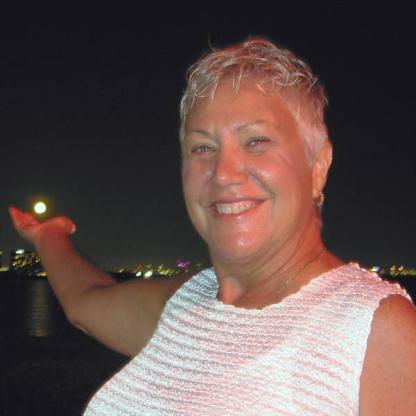
Questions
Contact Sandy Schmidt at 877-907-5360 or email Sandy.
